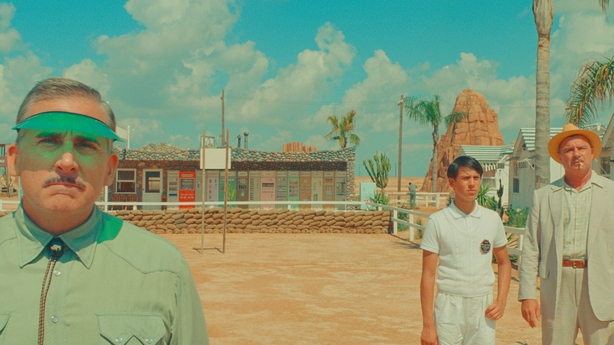Known for his unique style of storytelling and visual flair, writer and director Wes Anderson is a genre of cinema in his own right.
His latest film, comedy-drama Asteroid City, explores America in 1955 and boasts an ensemble cast of acclaimed actors, including Bryan Cranston, Tom Hanks, and Scarlett Johansson, to name but a few.
In his only Irish interview, he joins RTÉ Arena's Seán Rocks to talk about recreating theatre magic on set, how COVID "barged" into his movie, and what he really thinks about all those Wes Anderson memes.
There's only one way for @SeanRadioRocks to prepare for an interview with #WesAnderson 🤭👏🏼 Tonight at 7pm on @RTEArena 🎥 pic.twitter.com/8A1qHJGTkB
— RTÉ Radio 1 (@RTERadio1) June 21, 2023
From the offset, Asteroid City has all the hallmarks of a classic Wes Anderson movie. It is a film, about a TV show, about a play. And there are aliens.
Seán opens the conversation by asking why he chose to tell the story in this unique way.
Anderson explains that his initial intention was simple; to tell the story of a father traveling across the country with his kids following a catastrophic event. On the complex way the film is staged, he assures listeners they "won't have to think too much" and that the film will "lead you by the hand," saying:
"Even the description of this movie has probably got listeners extremely confused. But I think the way it’s told is quite careful. And I think the cast we have is so good. They pull you into it – I would hope, and you can experience the story without all this being a distraction."
Seán mentions comments made by actress Scarlett Johansson that the atmosphere on the set of Asteroid City was more like theatre than film. For Anderson, this came about because of the empty location, where the only people present on set were him, the cameraman, and the actors, adding:
"For me, it’s just being in a very quiet place, invented dessert, with these two actors – it was like going to a play for me. I watched Scarlett Johansson play these scenes in this window, and I was like an audience at a play."
Alien invasions and the COVID pandemic
Set in 1955, Asteroid City captures America in its post-war glory. What did that era give to the film?
Anderson agrees that there’s a somewhat "placid surface" to the film, saying:
"It’s Eisenhower America—backyards and golf courses and Cadillacs, and things. But there’s paranoia. There’s something left over from the war in many of these men. In our movie, you might notice almost every man carries a pistol."
"And there’s fear of aliens. The big aliens were the communists! But in America, that metaphor was quite noticeable in movies of the 50s. There were lots of stories that involved invasions… all of it sort of informs the next decade, the next generation, who really react to their parents in a kind of profound way. So I guess all that found its way into our story."
"When you're writing a movie, you’re doing something kind of improvisational. You’re always reacting to what’s going on in your life."
The language around 'invasion’ had a very different context in 1955 than it does now in the modern world. Does modern sentiment influence his work?
For Anderson, everything in life can "find a way" into the story, saying:
"To me, when you’re writing a movie, you’re doing something kind of improvisational. You’re always reacting to what’s going on in your life. You might be using something from your own family history or from people whom you’ve known, or just the thing you’ve been thinking about. But, inevitably, what’s going on with you day-to-day finds its way in."
"Part of what happened with his movie was the whole planet came to a halt. We were in the strangest lockdown situation, and that certainly barged into our story. And became a part of it. It somehow seemed right for it, oddly."

The Wes Anderson meme
Drawing the interview to a close, Seán had to ask Anderson about AI and meme culture, alluding to the viral meme sensation, ‘Acting Like You Are in A Wes Anderson Film.’
Does the writer and filmmaker worry about the role of AI in creative industries?
"In relation to the memeing of myself, I’ve managed to recuse myself from that – and I don’t see any of it!" he says.
"The only thing I would maybe like to have is, I’d like to ‘AI’ some kind of copyright attorney and see if it can ‘algorithm’ me some kind of royalty from some of those. But I’m sure that’s not going to happen."
But on talking about the more serious ramifications of AI, Anderson says he doesn’t find AI "all that ominous" at all, saying:
"When you sit and think about it, and when you read what people are saying about it, you start to say, ‘This is kind of doomsday; Doomsday for a lot of creative work. But I can’t say that I find myself obsessed with it. I then just carry on."
"We’ll see where that all leads. What can it do? What are its limits? Things do have limits, even when they seem a bit limitless like this."
Asteroid City is in cinemas now.
